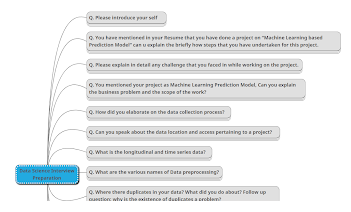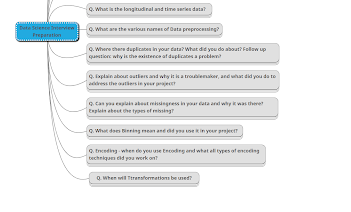Please double-click to open
Data Science Interview Preparation
Data Science has become the trendiest job in the 21st Century and it’s no surprise to us that it was dubbed the “Sexiest job of the 21st Century” by Harvard Business Review. The increase in the volume of data sources, and the velocity with which they come in has made data science one of the fastest-growing fields across every industry. Organizations are relying on data science to interpret data by taking actionable recommendations to improve business outcomes. Data science includes various roles, tools, and processes, which enable them to achieve insights from the data.
Data Science is a discipline where data scientists are the practitioners within that field. Data scientists are not responsible for all the project methodologies for example data pipeline is typically handled by data engineers – but the role of the data scientist is to recommend what time data has to be extracted for Analysis. while a data scientist can build machine learning models, handling such large efforts requires some software engineering skills to optimize a program to run more quickly. So at this time, it is common for a data scientist to partner with machine learning engineers to scale machine learning models.
The responsibilities of a data scientist can overlap with a data analyst, particularly with exploratory data analysis and data visualization. but the skills of a data scientist are broader than an average data analyst. Data scientists leverage common programming languages such as R and Python, to conduct statistical inferences and data visualizations.
The main question which arises here is, what is the data science interview preparation syllabus? To become a data scientist we should have knowledge of common programming languages like R which is an open-source programming language and environment for developing statistical computing and graphics, and Python which is a dynamic and flexible programming language that has rich libraries such as NumPy, Pandas, Matplotlib, etc, for analyzing data quickly. Additional to these we should have knowledge of SQL which is a standard query language that lets you access, store, manipulate, and retrieve data from databases. Along with these, we should also have a clear understanding of project management methodologies that is CRISP-ML(Q) which stands for a cross-industry standard process for machine learning with quality assurance.
which includes a total of six steps:
- Business Understanding - where a first document Project charter gets prepared on the document.
- Data Understanding – meaning what, and how the data has to be collected and for the project requirements.
- Model Building – where Machine learning models are built according to the data.
- Evaluation – The model is evaluated with Accuracy Measures and Error functions.
- Model Deployment – Getting to know what type of resources are required and where is accessible for regular monitoring and maintenance to continuously improve accuracy.
- Monitoring and Maintenance – To know if the performance of the model, hardware, and system updates are up to date without any degradation.
Additional to these we should also have a clear idea of Probability, Probability distributions, Inferential statistics, and Mathematical foundations.


Final Insights for Data Science Interview Success
A Data Science interview preparation mind map helps us to get a clear idea of what concepts to be prepared if we want to be Data Scientists. The above mind map give a clear idea of the Data Science interview preparation roadmap. The most important and simplest question that every interviewer asks in an interview is “Please introduce yourself!!” and about the projects that are mentioned in the resumes. Which follows the basic questions about the process and its requirements. To excel in Data Science interviews, it's essential to thoroughly understand the fundamentals, including programming, Machine Learning, and Statistical concepts, while being able to clearly explain your past projects and their impact. By following a structured interview preparation roadmap, candidates can confidently demonstrate their skills and approach to solving real-world data problems.